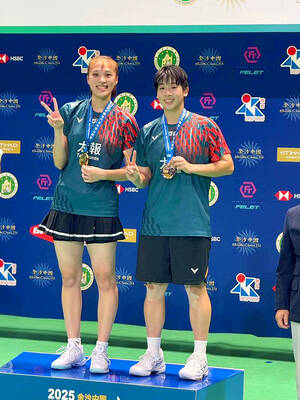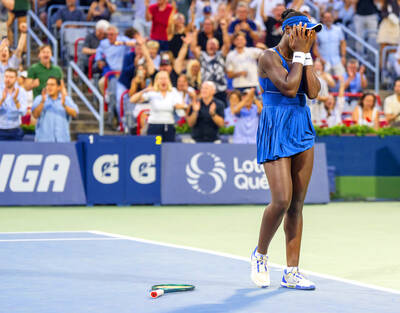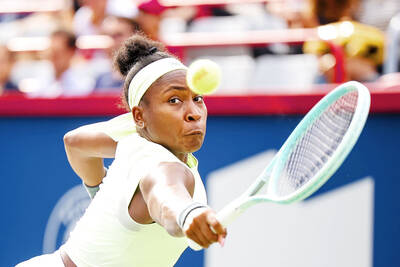In tropical Thailand, ice and sticks are most commonly found together in a tall glass holding a colorful cocktail.
But despite Bangkok's scorching temperatures, ice hockey is attracting a dedicated following among homesick expats and curious locals. The country has an amateur league and even a Thai National Team.
Over the past week, Bangkok has hosted the 10th edition of the international Bangkok Ice Hockey Tournament, attracting more than 200 competitors, many of whom travelled halfway round the world to crash and bang on the ice rather work on their tan.
The tournament featured teams from Russia, Canada, Switzerland, and Saudi Arabia, mixing it with Asian outfits from Japan, Hong Kong, and Malaysia for four days of high-caliber hockey reminiscent of that played in Europe and North America.
The regular Thai-World Hockey League has also proven a success after launching its inaugural season in September. The league comprises some 60 players -- half of which are Thai.
The TWHL is made up mainly of has-beens and never-will-bees who simply can't get the game out of their system, even in the tropics. The competition's biggest name is one Sheldon Bailey, formerly of the International Hockey League's San Diego Gulls.
But regardless of background or skill, players hailing from California to Massachusetts, British Columbia to Newfoundland -- along with a handful of Europeans -- lace up the blades and hit the ice twice a week to get their hockey fix.
"It's a wild experience playing hockey in Thailand," says TWHL Commissioner Scott Whitcomb, originally from Appleton, Wisconsin. "Expats are pumped that they can play the game they love despite being far away from home."
The sport is making quite an impact on local players as well.
Vanchalerm Rattapong, star player on the Thai national team, resolved to become a hockey player after watching Canada's Mario Lemieux score his memorable series-clinching goal against the Soviet Union in the 1987 Canada Cup.
With a laser-beam shot and blazing speed, Vanchalerm is known as the "Jaromir Jagr of Thailand." And for him, hockey is more than just a game.
"It is a very important part of my life," he says. "I work so I can afford to play hockey."
While Bangkok is becoming known as Southeast Asia's ``hockey town,'' the sport's development here hasn't been without hiccups.
The game was almost shut down before it got off the ground when Bangkok's main rink closed in 2000. Many players balked at the next best venue, which resembled a swimming pool more than a skating surface.
Notorious for their violent outbursts, the east-meets-west hockey rivalry between Thai and expatriate teams in the early days also threatened to bench the game permanently. A spiteful stick-swinging incident left a foreigner's, head bloodied, and a bench-clearing brawl ended with a Thai player's arm fractured.
"It was like a war out there," recalls Toronto native Scott Murray, player-coach of the Flying Farangs team. Farang is the general Thai term for westerners. "The Thais wanted to beat us. And of course, we always wanted to win."
Murray worked to keep the game alive and recruited players from hockey-playing nations to inject the necessary lifeblood.
But the biggest boost arrived in November 2003 when Bangkok's Central World Plaza overcame its fear of flying pucks and dropped its long-standing policy of banning the game from its rink. Thai hockey now had a pristine, Olympic-sized ice surface. It was game on.
And despite taking several thrashings in international competition that would have disillusioned a less resilient culture, the Thai National Hockey Team keeps coming back for more.
On the Web:
Flying Farangs Ice Hockey Club: www.flyingfarangs.com

Taiwan’s top women’s badminton doubles duo, Hsieh Pei-shan (謝沛珊) and Hung En-tzu (洪恩慈), achieved a straight-sets victory over Japan’s Kaho Osawa and Mayui Tanabe at the Badminton World Federation (BWF) Super 300 Macau Open on Sunday. The Taiwanese pair won the final 21-18, 21-12, marking the duo’s second title this year after their win at the BWF Super 300 Taipei Open in May. The match on Sunday was their first encounter with the Japanese duo, ranked No. 63 in the world. Hsieh and Hung, ranked No. 12, began the opening game well. Hung, who plays left-handed, performed strongly at both the net and the

Canadian teenager Victoria Mboko upset top-seeded Coco Gauff 6-1, 6-4 on Saturday night to reach the National Bank Open quarter-finals. “Your support was incredible,” Mboko told the crowd in French after a chorus of “Ole, Ole, Ole” chants echoed around the venue. “I’m really happy to win today ... It’s incredible. I’m so happy to beat such a great champion.” Gauff dropped to 2-3 since winning the French Open. She followed the major victory with opening losses in Berlin and Wimbledon, then overcame double-fault problems to win two three-set matches in Montreal. Gauff had five double-faults on Saturday after having 23 in

Formula 1 champion Max Verstappen on Thursday said that he is staying with the Red Bull team next year, ending months of speculation over his future. “Some people just like to stir the pot, some people just like to create drama, but, for me, it’s always been quite clear, and also for next year,” the four-time champion said ahead of the Hungarian Grand Prix. “I’m discussing with the team already the plans — the things that we want to change for next year, so that means that I’m also staying with the team for next year,” he said. Verstappen has a contract with

Alex Michelsen on Thursday rallied for a 3-6, 7-6 (7/4), 6-4 upset victory over third-seeded Lorenzo Musetti in the men’s singles, converting his seventh match point to reach the fourth round of the Canadian Open. Michelsen reached the last 16 of a Masters 1000 for the first time with his second win over a top-10 player in eight attempts. The 20-year-old American survived nearly 50 unforced errors and converted just two of nine break chances, but it was enough to vanquish Italy’s Musetti, a two-time Grand Slam semi-finalist ranked 10th in the world. “It feels really good,” the 26th-ranked Michelsen said. “I’ve put